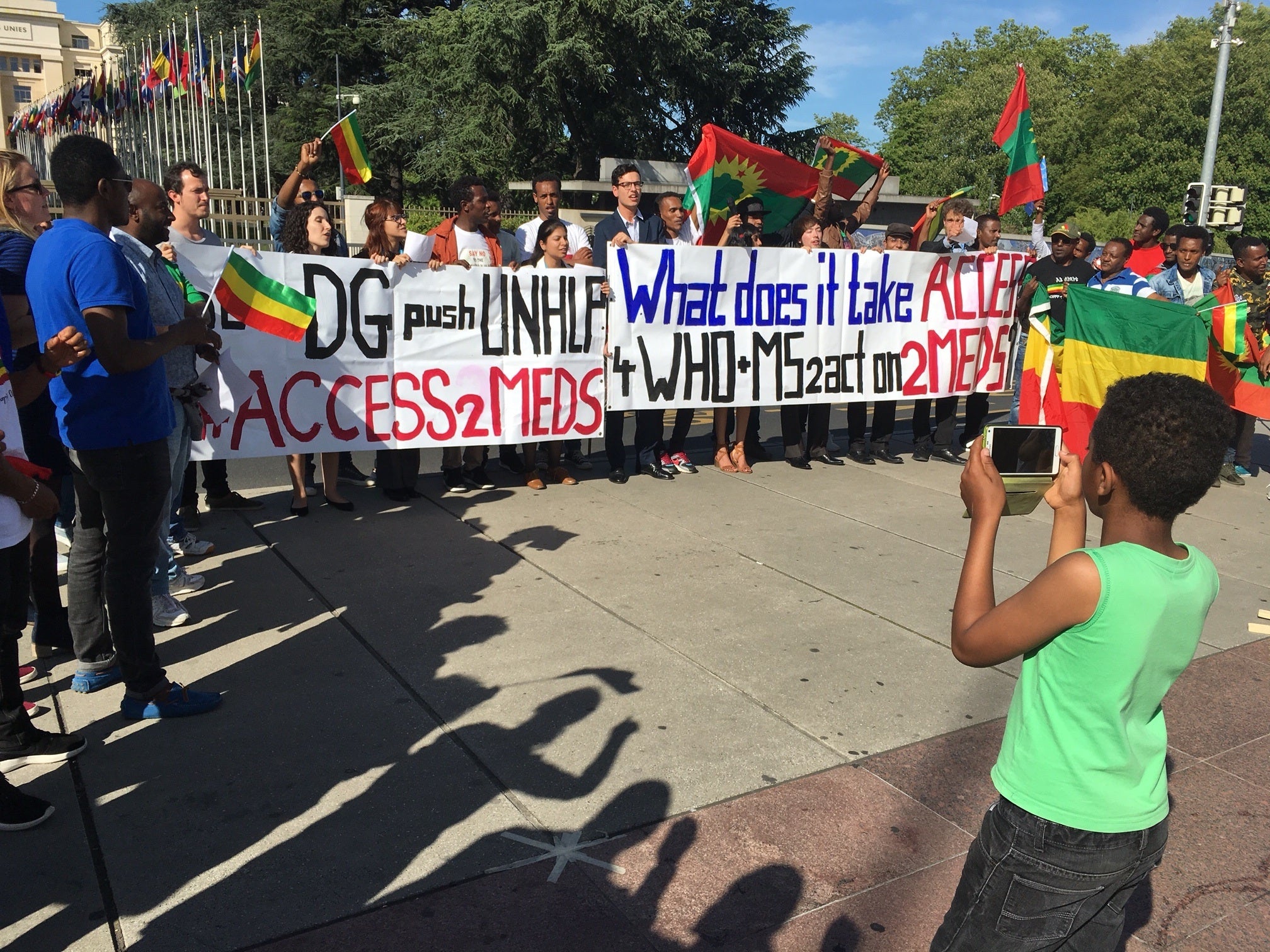 Fran Quigley, from the WHA in Geneva
Fran Quigley, from the WHA in Geneva
In her final address to the World Health Assembly as WHO Director-General, Dr. Margaret Chan identified access to medicines as the most contentious issue of her decade-long tenure. That struggle was engaged, she said, “especially when intellectual property and the patent system were perceived as barriers to both affordable prices and the development of new products for diseases of the poor.”
Dr. Chan also had advice for the delegates gathered before her at the Palais de Nations in Geneva: “Listen to civil society. Civil society are society’s conscience.”
Civil society wasted no time providing opportunities to follow that advice.
Just a few hours after Dr. Chan yielded the podium, a spirited demonstration was held outside the grounds of the Palais de Nation. Organized by the student-led advocacy group Universities Allied for Essential Medicines, the demonstrators called for the WHA delegates and the new director-general, set to be elected tomorrow, to listen to the WHA’s member states from Southeast Asia, Africa, and Latin America. Those nations have long called for WHO to prioritise the medicines issue.
“We are tired of this access to medicines agenda being blocked by the few and the powerful,” UAEM’s European coordinator Nina Le Dous told the assembled crowd. “WHO is failing in its mission as a health organization by not taking these member states’ issues seriously.”
The group positioned their banners so the delegates exiting the WHA session could not avoid seeing them, and chanted, “Medicines for People, Not Profit!” and “Health is a Human Right: We’ve Got to Keep Up the Fight, Fight, Fight!”
At the same time, back in the Palais de Nation, an overflow crowd packed into a conference room to hear civil society speak out in a side event. This discussion focused on the challenge of antimicrobial resistance, and was co-sponsored by Médecins Sans Frontières, Drugs for Neglected Diseases initiative (DNDi), Health Action International, Medicus Mundi International, South Centre, and ReAct-Action on Antibiotic Resistance, all members of the Antibiotic Resistance Coalition.
Their comments were nicely set up by Dr. Chan, whose WHA address singled out the challenge of antibiotics development, just as she had a week earlier in her address to the G20 Health Ministers. During both speeches, Dr. Chan proudly touted WHO’s partnership on antibiotic research with the widely-celebrated nonprofit drug developer DNDi. At the WHA she emphasized the program’s “needs-driven” basis, and told the G20 ministers that the partnership “aims to ensure that prices are affordable, and it does so by delinking the costs of R&D from new product prices.”
The term “de-linkage” was repeated by many panelists in the antimicrobial resistance discussion. It describes a drug development model that is an alternative to the current intellectual property paradigm, where government-granted patent monopolies allow drug prices to be hiked to levels that are sometimes hundreds of times above the price of production. The justification for the high prices is that the price charged for medicines needs to fund research and development.
Of course, that justification is hugely exaggerated when made by an industry that spends more on marketing and lobbying, and reaps more in profits, than it spends on R&D. But deliberately “de-linking” the R&D costs from the price of medicines bypasses those calculations, and instead undercuts the very foundation of the monopoly pricing argument. It calls for taking advantage of the already-significant government and philanthropic commitment to research and using it to fund nonprofit R&D to a sufficient level that the price of medicines does not need to be connected to research costs. This would allow medicines to be far more affordable.
Sound familiar? It should. The terms used inside the Palais de Nations were “needs-based” and “de-linkage,” but they aligned with the demands of the people demonstrating outside. The panelists—and Dr. Chan—were calling for “Medicines for people, not for profit!”
Fran Quigley is a clinical professor and director of the Health and Human Rights Clinic at Indiana University McKinney School of Law. He is the Health and Human Rights Journal correspondent at the World Health Assembly, May 2017.
